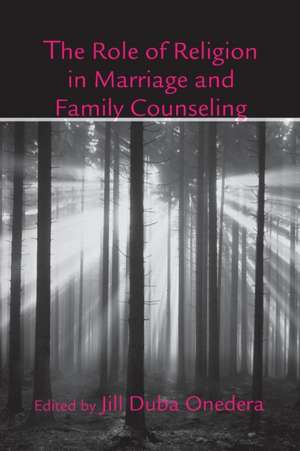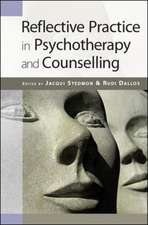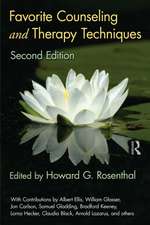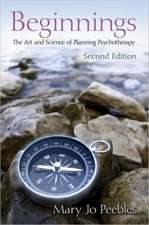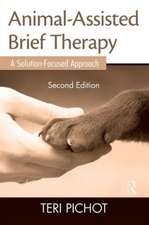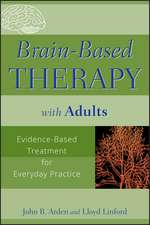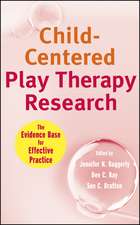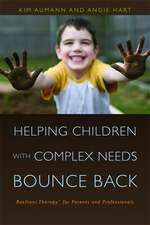The Role of Religion in Marriage and Family Counseling: Routledge Series on Family Therapy and Counseling
Editat de Jill Duba Onederaen Limba Engleză Paperback – 27 feb 2015
| Toate formatele și edițiile | Preț | Express |
|---|---|---|
| Paperback (1) | 420.38 lei 43-57 zile | |
| Taylor & Francis – 27 feb 2015 | 420.38 lei 43-57 zile | |
| Hardback (1) | 981.55 lei 43-57 zile | |
| Taylor & Francis – 19 iul 2007 | 981.55 lei 43-57 zile |
Din seria Routledge Series on Family Therapy and Counseling
-
 Preț: 364.63 lei
Preț: 364.63 lei - 5%
 Preț: 418.58 lei
Preț: 418.58 lei - 5%
 Preț: 420.38 lei
Preț: 420.38 lei - 5%
 Preț: 418.22 lei
Preț: 418.22 lei - 5%
 Preț: 401.47 lei
Preț: 401.47 lei -
 Preț: 416.83 lei
Preț: 416.83 lei - 5%
 Preț: 453.68 lei
Preț: 453.68 lei - 5%
 Preț: 501.63 lei
Preț: 501.63 lei - 5%
 Preț: 379.80 lei
Preț: 379.80 lei - 5%
 Preț: 440.14 lei
Preț: 440.14 lei - 5%
 Preț: 1735.80 lei
Preț: 1735.80 lei - 5%
 Preț: 943.94 lei
Preț: 943.94 lei - 18%
 Preț: 812.08 lei
Preț: 812.08 lei - 12%
 Preț: 333.25 lei
Preț: 333.25 lei - 5%
 Preț: 455.71 lei
Preț: 455.71 lei - 5%
 Preț: 460.89 lei
Preț: 460.89 lei - 17%
 Preț: 362.22 lei
Preț: 362.22 lei - 5%
 Preț: 486.33 lei
Preț: 486.33 lei - 18%
 Preț: 1166.01 lei
Preț: 1166.01 lei -
 Preț: 440.22 lei
Preț: 440.22 lei - 5%
 Preț: 458.28 lei
Preț: 458.28 lei - 5%
 Preț: 419.45 lei
Preț: 419.45 lei - 5%
 Preț: 370.85 lei
Preț: 370.85 lei -
 Preț: 447.31 lei
Preț: 447.31 lei
Preț: 420.38 lei
Preț vechi: 442.50 lei
-5% Nou
Puncte Express: 631
Preț estimativ în valută:
80.44€ • 84.21$ • 66.56£
80.44€ • 84.21$ • 66.56£
Carte tipărită la comandă
Livrare economică 07-21 aprilie
Preluare comenzi: 021 569.72.76
Specificații
ISBN-13: 9781138871618
ISBN-10: 1138871613
Pagini: 320
Dimensiuni: 152 x 229 x 17 mm
Greutate: 0.45 kg
Ediția:1
Editura: Taylor & Francis
Colecția Routledge
Seria Routledge Series on Family Therapy and Counseling
Locul publicării:Oxford, United Kingdom
ISBN-10: 1138871613
Pagini: 320
Dimensiuni: 152 x 229 x 17 mm
Greutate: 0.45 kg
Ediția:1
Editura: Taylor & Francis
Colecția Routledge
Seria Routledge Series on Family Therapy and Counseling
Locul publicării:Oxford, United Kingdom
Public țintă
Professional Practice & DevelopmentCuprins
The Opening Dialogue: Identifying the Holy Elephant in the Counseling Room. Onedera, Greenwalt, Introduction to Religion and Marriage and Family Counseling: Religiosity versus Spirituality. Worthington, Hook, Wade, Miller, Sharp, The Effects of a Therapist’s Religion on the Marriage Therapist and Marriage Counseling. Religious Context within Marriage and Family Counseling. Onedera, The Practice of Marriage and Family Counseling and Catholicism. Zink, The Practice of Marriage and Family Counseling and Conservative Christianity. Cook, The Practice of Marriage and Family Counseling and Liberal Christianity. Altareb, The Practice of Marriage and Family Counseling and Islam. Shaneman, The Practice of Marriage and Family Counseling and Buddhism. Madathil, Sandhu, The Practice of Marriage and Family Counseling and Hinduism. Dorff, The Practice of Marriage and Family Counseling and Judaism. Bruyere, The Practice of Marriage and Family Counseling and Native Religions. Koepsell, Mercurio-Riley, The Practice of Marriage and Family Counseling and Humanism. Religion and Relationships. Centore, Clinton, Benefits of Religion on Recovery From Relationship Problems. Holeman, The Role of Forgiveness in Religious Life and Within Marriage and Family Relationships. Lara, Onedera, Inter-religion Marriages. Religion and the Counselor. Deaner, Pechersky, McFadden, Ethnicity: Religious Practice and Marriage and Family Counseling Implications. Onedera, Minatrea, Kindsvatter, Collaboration Between Licensed Mental Health Professionals and Religious Leaders. Onedera, Incorporating Religion Within Marriage and Family Counseling Programs.
Notă biografică
Jill D. Onedera, Ph.D., MFT, is a counselor educator at Western Kentucky University, in the Department of Counseling and Student Affairs, in the Marriage and Family track, and Marriage and Family Therapy Associate, Life Skills Inc.
Recenzii
"My overall reaction to this proposal is favorable, with some specific suggestions. The market is graduate students in counseling and therapy degree programs. There is also a market for the book with every counselor in practice. Therefore, the potential market is the entire profession. The material is timely, written in a unique approach. The use of invited authors is a very good decision for this type of book; the quality of the book therefore becomes disproportionately influenced by the editors’ choice of authors. The heart of the book is chapters three thru eleven, where six religions are represented by the invited authors. The proposed format: write from your specific religious background: definition of marriage; roles within marriages and families; child bearing; birth control; abortion; and teenage pregnancy; finances; dissolving relationships, divorce, and annulment; managing the family after separation and/or divorce; death and dying; and homosexuality in couples and families in that religion. I believe this is a excellent chapter format and is a good representation of the world’s religions. As the authors note, it is not possible to cover every derivation of these religions. I am really not aware of any competing titles for this book. The shelf-life of the book would be long; there is no expiration date on religion or spirituality. The authors are correct – this is a neglected, important element in counseling. Successfully executed, this text is a winner and significant contribution to the profession."
- Don Dinkmeyer, Jr., Ph.D., LPPC, NCC, Professor, Counseling Programs, Western Kentucky University
"The editors have identified mental health practitioners (e.g., professional counselors, marriage and family therapists, social workers) as being the primary audience, and have identified persons in training for (and those providing training within) such professions as being the secondary audience. With a primary focus on practice, I would expect to see identification and discussion of specific counselor/therapist styles, approaches, and interventions when working with couples and families throughout the book. I believe the market for this proposed book is limited to (a) practicing counselors/therapists with an interest in further understanding the religious tradition(s) of their clients; (b) counseling faculty within a religiously-affiliated counseling program (e.g., pastoral counseling); and (c) counseling faculty attempting to further incorporate issues of spirituality and religion within their courses. If the book were to focus more on actual counseling/therapy practices in session with couples and families, I believe the book would have a wider appeal. I would encourage the editors and their contributing authors to provide clinical or case examples of infusing or addressing religious beliefs and practices within marriage and family counseling, especially when the primary audience has been identified as practitioners. From the authors’ own experiences, how have certain religious beliefs and practices been dealt with in the actual practice of counseling? What are some case examples the authors can provide (which I realize may be difficult if not all contributing authors are mental health professionals)? In addition, what might be some instances of "what not to do" based on the authors’ own experiences with clients (e.g., certain foibles or stumbles)? I would recommend this book for publication if the editors and their contributing authors are able to (a) provide further references/support from the scholarly literature for various opinion statements made throughout (which I have mentioned above), and (b) speak directly to practice issues in marriage and family counseling to illustrate how religion is applied within sessions (again, if the primary intended audience will be practitioners)."
- Cynthia J. Osborn, Ph.D., author, Leaders and Legacies
"I agree that counselors, social workers, and MFTs would be the main market. Secondary audience will be graduate mental health students. I do believe this market is growing and will continue to be receptive to specialized titles such as this one. Now most houses have one or more general spirituality and therapy title(s), so I don’t suspect that this market will be as receptive to ‘more of the same titles,’ but this one is different; first because it focuses on dominant world religions, and secondly, because it addresses marital and family issues. I am quite favorable toward the proposal. It appears that the outline to chapters 3-11 will include very pertinent information – topical outline – on each of the major religions such as views of dating and cohabitation, children rearing, divorce, etc. In my opinion, such a focus will be the most valuable part of the book. I’m not aware of another book that addresses the issues in the topical outline as this one. I would recommend it for publication if the focus is more clinically oriented."
- Len Sperry, M.D., Ph.D., author, Spirituality in Counseling
- Don Dinkmeyer, Jr., Ph.D., LPPC, NCC, Professor, Counseling Programs, Western Kentucky University
"The editors have identified mental health practitioners (e.g., professional counselors, marriage and family therapists, social workers) as being the primary audience, and have identified persons in training for (and those providing training within) such professions as being the secondary audience. With a primary focus on practice, I would expect to see identification and discussion of specific counselor/therapist styles, approaches, and interventions when working with couples and families throughout the book. I believe the market for this proposed book is limited to (a) practicing counselors/therapists with an interest in further understanding the religious tradition(s) of their clients; (b) counseling faculty within a religiously-affiliated counseling program (e.g., pastoral counseling); and (c) counseling faculty attempting to further incorporate issues of spirituality and religion within their courses. If the book were to focus more on actual counseling/therapy practices in session with couples and families, I believe the book would have a wider appeal. I would encourage the editors and their contributing authors to provide clinical or case examples of infusing or addressing religious beliefs and practices within marriage and family counseling, especially when the primary audience has been identified as practitioners. From the authors’ own experiences, how have certain religious beliefs and practices been dealt with in the actual practice of counseling? What are some case examples the authors can provide (which I realize may be difficult if not all contributing authors are mental health professionals)? In addition, what might be some instances of "what not to do" based on the authors’ own experiences with clients (e.g., certain foibles or stumbles)? I would recommend this book for publication if the editors and their contributing authors are able to (a) provide further references/support from the scholarly literature for various opinion statements made throughout (which I have mentioned above), and (b) speak directly to practice issues in marriage and family counseling to illustrate how religion is applied within sessions (again, if the primary intended audience will be practitioners)."
- Cynthia J. Osborn, Ph.D., author, Leaders and Legacies
"I agree that counselors, social workers, and MFTs would be the main market. Secondary audience will be graduate mental health students. I do believe this market is growing and will continue to be receptive to specialized titles such as this one. Now most houses have one or more general spirituality and therapy title(s), so I don’t suspect that this market will be as receptive to ‘more of the same titles,’ but this one is different; first because it focuses on dominant world religions, and secondly, because it addresses marital and family issues. I am quite favorable toward the proposal. It appears that the outline to chapters 3-11 will include very pertinent information – topical outline – on each of the major religions such as views of dating and cohabitation, children rearing, divorce, etc. In my opinion, such a focus will be the most valuable part of the book. I’m not aware of another book that addresses the issues in the topical outline as this one. I would recommend it for publication if the focus is more clinically oriented."
- Len Sperry, M.D., Ph.D., author, Spirituality in Counseling
